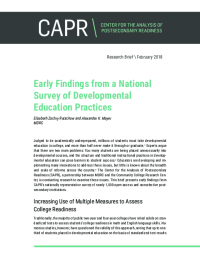Early Findings from a National Survey of Developmental Education Practices

Judged to be academically underprepared, millions of students must take developmental education in college, and more than half never make it through or graduate. Experts argue that there are two main problems: Too many students are being placed unnecessarily into developmental courses, and the structure and traditional instructional practices in developmental education can pose barriers to student success. Educators are developing and implementing many innovations to address these issues, but little is known about the breadth and scale of reforms across the country. The Center for the Analysis of Postsecondary Readiness (CAPR), a partnership between MDRC and the Community College Research Center, is conducting research to examine these issues.
This brief presents early findings from CAPR’s nationally representative survey of nearly 1,000 open-access and nonselective postsecondary institutions. The survey reveals that community colleges are increasingly using measures in addition to standardized tests, such as high school grade point average, to assess students’ readiness for college-level math and reading. Community colleges are also experimenting with a variety of instructional reforms, such as compressing developmental courses into a shorter time frame, offering multiple math pathways to align with different programs of study, and combining developmental reading and writing courses.






